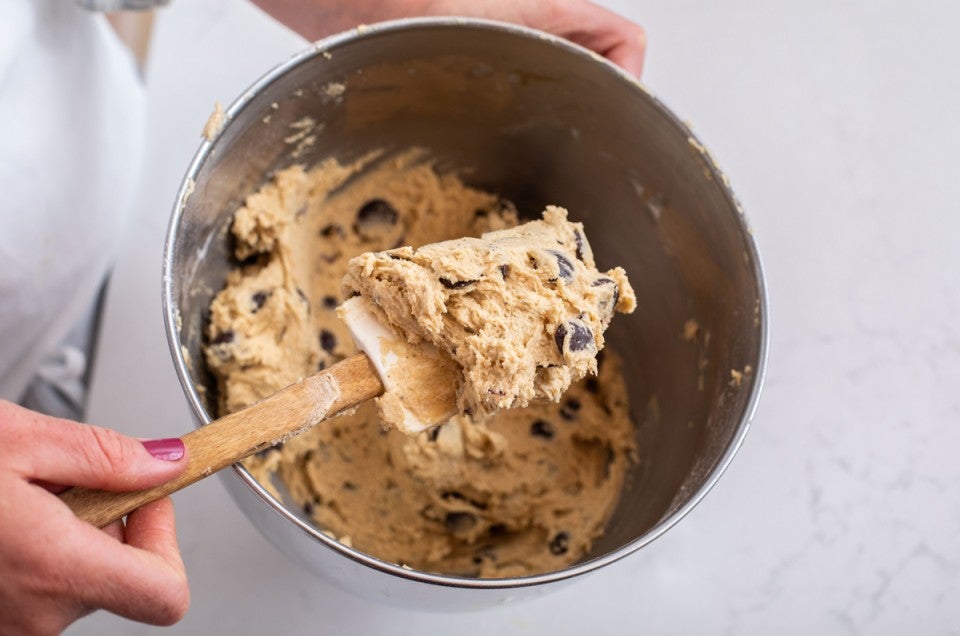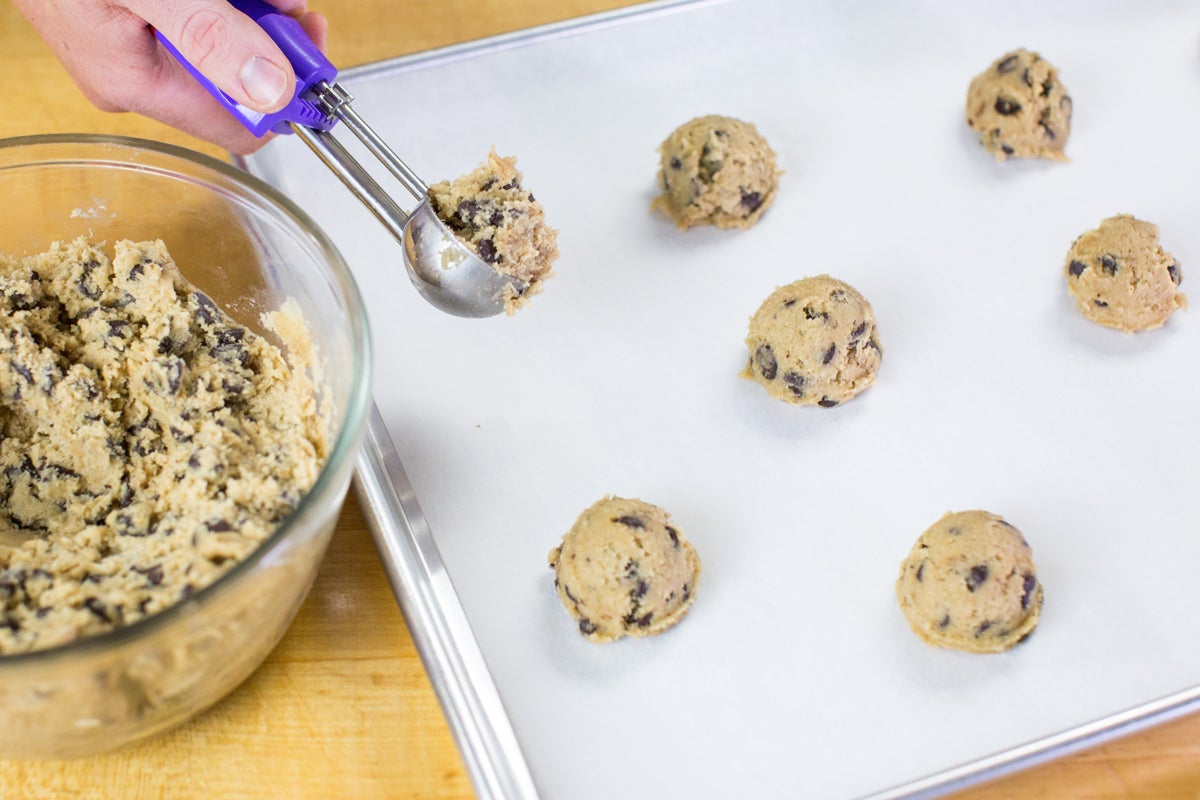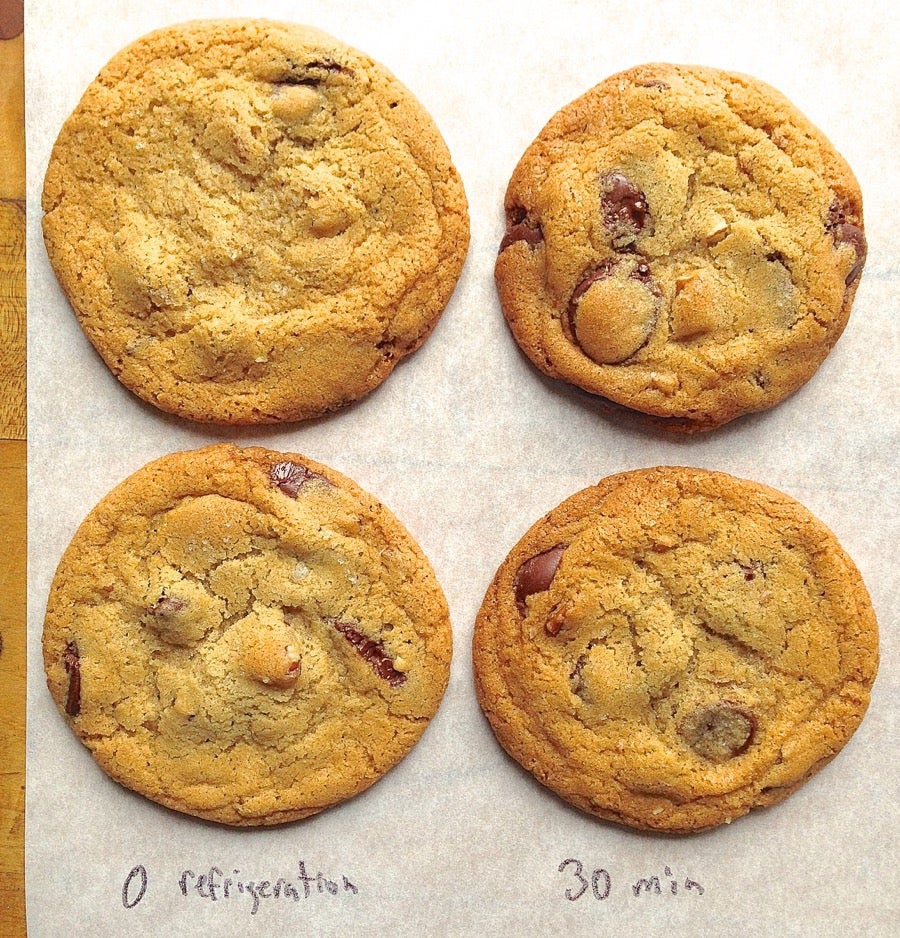Chilling cookie dough: Does it make a difference?
And how long do you need to chill your dough for?


Why refrigerate chocolate chip cookie dough — or for that matter, any basic drop cookie dough — before baking? Does chilling cookie dough really make any difference?
The short answer: yes, chilling cookie dough prior to baking does make a difference. But the story behind that "yes" might surprise you.
We recently tested this question with a batch of chocolate chip cookie dough. Understand, though, that these results can be applied to other kinds of plain drop cookie dough: sugar cookies, snickerdoodles, etc.
First, we baked some of the cookie dough immediately, without any chilling.
The result?
The cookies pictured above are the same size, weight-wise. But look at the difference in spread — the cookie dough that was refrigerated spread less. The cookie dough without refrigeration also browned less.
So, the longer the dough is chilled, the more the cookies change?
Call it the law of diminishing returns. The major difference is between no chilling at all vs. chilling cookie dough for 30 minutes. After that, the baked cookie continues to evolve — though very gradually.
Here you see the beginning and end of the test: Clearly the cookie baked from dough aged for 10 days in the refrigerator spread less and is darker in color. Its flavor is also more pronounced; our taste testers couldn't identify any particular flavor note that stood out above the rest, but simply noted that the cookie aged for 10 days "tastes better" than the cookie baked on day #1.
Overall, cookies baked immediately tasted rather flat; and their texture was soft and rather doughy, without being chewy. Cookies baked after chilling the dough (for as little as 30 minutes) became chewy, and progressively more flavorful with longer aging.
Chilling cookie dough before baking solidifies the fat in the cookies. As the cookies bake, the fat in the chilled cookie dough takes longer to melt than room-temperature fat. And the longer the fat remains solid, the less cookies spread.
In addition, the sugar in the dough gradually absorbs liquid. If you bake the dough immediately, before sugar has a chance to absorb much liquid, that liquid remains "free" in the dough, and promotes spread. Think of this in terms of thin vs. thick pancake batter: the more liquid in batter, the more it spreads, right? Same with cookies.

As the dough chills, it gradually dries out, concentrating the flavors of all the ingredients. Think of watered-down lemonade, vs. lemonade with less water: dull flavor vs. bright, tangy flavor. Same with cookies.
Something else happens as the dough rests: part of the flour breaks down into its component parts, including a simple carbohydrate, sugar. Thus, since sugar is a flavor enhancer (like salt), the cookies may taste more flavorful, as well as sweeter after aging.
Again, it's not really the chilling, but the dough gradually drying out, that's responsible for texture change. The drier the dough, the more concentrated the sugar. And a higher percentage of sugar creates cookies with chewy/crisp (rather than soft/doughy) texture.
So, enough with the science; let's enjoy one of these fresh-baked chocolate chip cookies, shall we? At the end of the day — or even after just 30 minutes — there's simply nothing finer.
Do you have any chocolate chip cookie tips to pass along? Please share in "comments," below.





October 23, 2019 at 11:20am
In reply to Since refrigerated cc cookie… by Elaine M, Denver, NC (not verified)
Hi Elaine! Other than a little elbow grease, there's no secret to scooping the dough. You could wait until it softens a little bit to scoop, or scoop it while it's soft and let it chill in the fridge on your sheet pan covered with plastic wrap if you have the room.
November 4, 2019 at 10:34am
In reply to Hi Elaine! Other than a… by anicholson
So there is No difference between Portioning out the dough immediately after mixing, then Resting overnight vs. Resting overnight, then Portioning (besides elbow grease)? I've always done it the first way (immediate portioning before resting), but all the articles recommending the overnight rest always give directions to portion post-rest (without explaining whether that's important).
On a separate-though related topic, I always freeze most of my dough immediately after portioning (I'll leave 8 dough balls in the fridge to rest-then-bake the next day, but put the rest of the dough balls in the freezer, with no overnight rest in the fridge). Does going straight into the freezer impact the dough resting process in any way (would it be better to rest all the balls overnight, then freeze what I'm not immediately baking?) I've looked and looked for a substantive answer to this question without success.
November 4, 2019 at 11:24am
In reply to So there is No difference… by RoLo (not verified)
Hi Rolo, it's really just when you have the time to scoop. Is it right after you've made the dough or is it later on? Either is just fine. As for the freezing question, that isn't something we've tested enough to have noticed any distinct differences between dough frozen immediately after mixing versus dough that's sat around and then frozen. Speaking from personal experience, I've noticed no difference.
October 12, 2019 at 9:28pm
Should you thaw your chilled chocolate chip cookie dough before baking or will it spread evenly? (I want to make sure it doesn't remain rounded when baked. I'm trying to make a very thin chewy cookie).
October 13, 2019 at 10:33am
In reply to Should you thaw your chilled… by Holly B (not verified)
Hi Holly! Chilling the cookie dough will help prevent the cookies from spreading, so if you're going for a thinner cookie you'll want to chill the dough for a short period of time, if at all. If you're looking for some of the other benefits talked about here (deeper flavor, chewy/crisp texture) you might consider flattening the scooped balls of dough before baking them so they spread a bit more. Happy baking!
September 18, 2019 at 6:37pm
Does chilling make a difference between shortening and butter? My mother always used Cisco in her chocolate chip cookies.
September 19, 2019 at 10:55am
In reply to Does chilling make a… by Brenda (not verified)
Good question, Brenda! You'll definitely see a more pronounced difference in cookies made with butter, but chilling will still have an impact on cookies made with shortening too. Happy baking!
December 31, 2019 at 8:56pm
In reply to Good question, Brenda! You… by kmayerovitch
As a 75 1/2 year old, I went from Crisco, to Margarine, and finally...BUTTER, the secret ingredient in everything. I actually found a butter flavoring that made my pre-butter cookie recipe a real secret. I withheld the "butter flavoring" when I gave out the recipe How ever you feel about chilling or just getting the baking over with...use butter. There is nothing in the world that will make cookies healthy, especially my oatmeal chocolate chip recipe, so I will not even try. I will try chilling overnight. If that makes them better, I am thrilled. I will have the pleasure of withholding one step in the preparation. Thanks for the heads up. P.S. for the last 10 years, I have used whole wheat flour....same great cookie just better.
August 9, 2019 at 2:51pm
Hi,
If I were planning to freeze the unbaked dough, would you still recommend chilling before portioning? Also, due to the fact that chilling affects the final result, when baking frozen cookie dough, would it be better to thaw in the refrigerator than at room temperature?
August 10, 2019 at 11:09am
In reply to Hi, If I were planning to… by Danna Meshoula… (not verified)
Hi Danna! No need to put the dough in the fridge if you're going to put it into the freezer. As for baking after freezing, it's up to you whether you want to thaw it out first or not. If you bake from frozen they'll take a couple of extra minutes in the oven and you may have to pull them out part-way through the bake time to press them down with the bottom of a measuring cup because they'll probably have a bit of a hump in the middle. Annabelle@KAF
Pagination